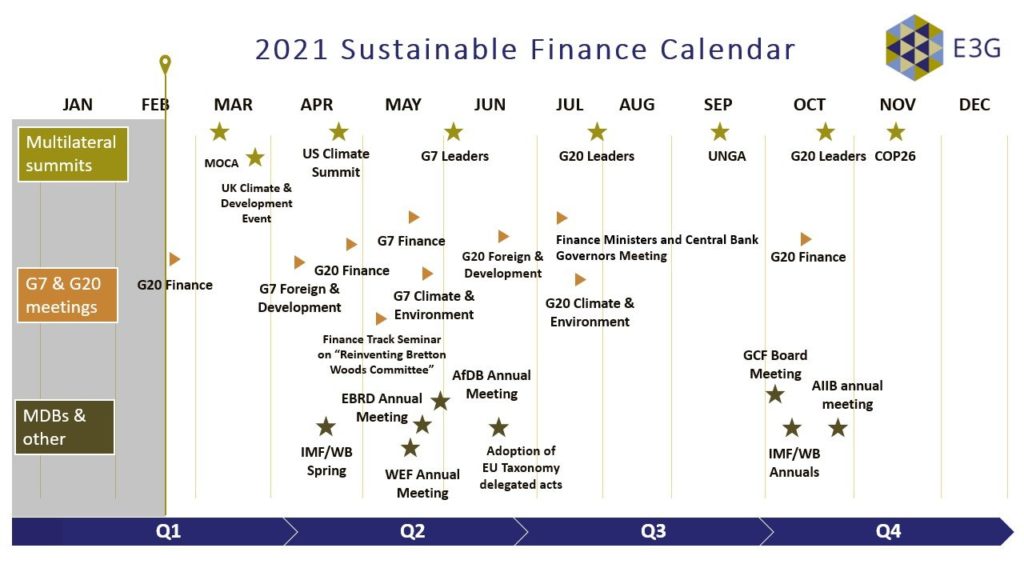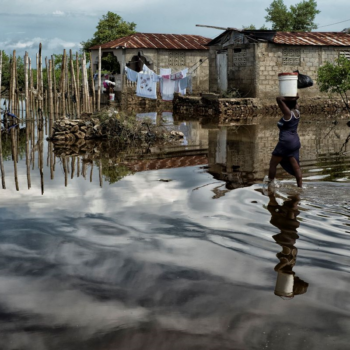2021 is set to be a very important year. How scarred or healed will the world collectively be when countries emerge from the pandemic and work through the economic crisis it has triggered? Will these impacts deepen existing socioeconomic inequalities, or set us on a better course? Will the choices we make this year take us on or off the path to climate safety? The responsibility to address these three related questions lays with an unlikely group of decision-makers: finance ministers of the G20. This year marks a turning point for the global economic policy-making that they are responsible for.

Finance ministers’ 2021 timeline—the clock is ticking
The quarterly meetings of the G20 finance ministers will be key moments to watch, starting with their first meeting on February 26 and 27. The chosen agenda theme for this—“Recovery and Transformation”—is wholly appropriate. It will take place two weeks after the first meeting of G7 finance ministers, which has already delivered promising signals (if not concrete solutions) for global green recovery.
The upcoming G20 finance ministers meeting must kick-start action for the year (see E3G’s recommendations for this G20 meeting here). Both developed and developing countries are already facing significant economic challenges which need to be urgently addressed. G20 finance ministers will have to work hard and early in the year on key topics including greening recovery spending and addressing challenges facing vulnerable countries. How much consensus is reached at this first meeting, and how ambitious the resulting joint statement and workplan is, will determine the level of ambition, and therefore the pace of work, for the rest of the year.
G20 finance ministers will have to work hard and early in the year on key topics including greening recovery spending and addressing challenges facing vulnerable countries.
The next important sequence to watch begins a month later, with the potential to set the course of the future global economy and climate transition. As is the case every year, G20 finance ministers will be meeting early April, at the same time as the IMF and the World Bank hold their annual spring meetings. In 2021, this annual sequence will be bookended by the UK’s Climate and Development ministerial event (end of March) and US President Biden’s leaders’ summit on climate (Earth Day, April 22).
Assuming decisive action on the most urgent concerns relating to recovery and economic relief can be taken at the G20 early enough in the first half of the year, there will then be enough time to lay the foundations for deeper long-term reforms to the global financial system. These are also needed for future economic sustainability.
The role of finance ministers in the global recovery
If climate considerations are not placed at the heart of economic policy then the recovery will accelerate the climate crisis, deepen existing economic fractures, and put us collectively at risk.
In economically developed countries the crisis is forcing economic decision-makers to make full use of the toolbox they have at their disposal and engage in expansionary policies, i.e. to spend money. The risk here is that spending decisions may largely support existing economic structures that are incompatible with a climate-safe future. For example, propping up the already failing oil and gas industry.
As the leading group for international economic cooperation, the G20 finance ministers forum is where the twin challenges of climate change and economic recovery will have to be addressed.
In economically developing countries the picture and risk are different, but the role of the G20 is still crucial. These countries have very little spending room to begin with, which means it is extremely difficult for them to address urgent economic and social needs, let alone plan for a climate-safe future.
The G7 will also play an important role in setting the tone and laying the groundwork for these issues. The UK hosting the COP26 at the same time as it presides over the G7 this year, is especially welcome news. But as the leading group for international economic cooperation, the G20 finance ministers forum is where the twin challenges of climate change and economic recovery will have to be addressed.
Key aims
Meeting under the Italian G20 presidency, G20 finance ministers should focus their mandate on three major goals:
- Greening all recovery spending or stimulus packages put in place by G20 members (see E3G’s green recovery guide for national economic advisors here);
- Working together to create lasting solutions for vulnerable economies’ lack of fiscal space and enabling spending on sustainable recovery measures. This priority, as well as the green recovery spending priority just mentioned, both need multilateral development banks (MDBs) to become transformational leaders of the transition to climate safety. Here too, as shareholders sitting on boards of multilateral development banks, finance ministers have a key role to play (see Jonathan Walter’s blog on MDBs in this newsletter here);
- Laying the foundations for a series of structural long-term reforms to the global financial system that redirect public and private financial flows towards sustainable economic activities and away from those that risk climate safety.
A key question to be answered in coming months is what role the US will play in this year’s G20. With US leadership, the possibilities are almost limitless. But there are other important developments to keep an eye on as well. For example:
- the work done by the European Union and China on common grounds for a global taxonomy of sustainable economic activities;
- the European Central Bank’s strategic monetary policy review; and
- the US Federal Reserve’s annual monetary policy conference in Jackson Hole.
These will all feed into the G20’s structural reform agenda, as will decisions by finance ministers of EU Member States on recovery and fiscal policy.
The G20 is the place where the world’s key discussions on economic and financial reform will come together. The stakes in 2021 could not be higher. This year’s economic choices will define the future economy and climate safety of billions of people. We must all be ready to add our voices in support of the values and goals we want to see triumph.


